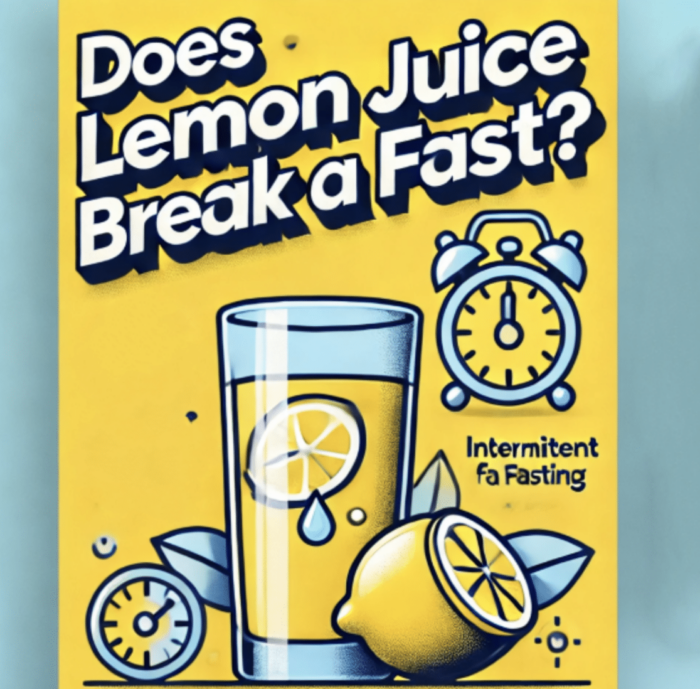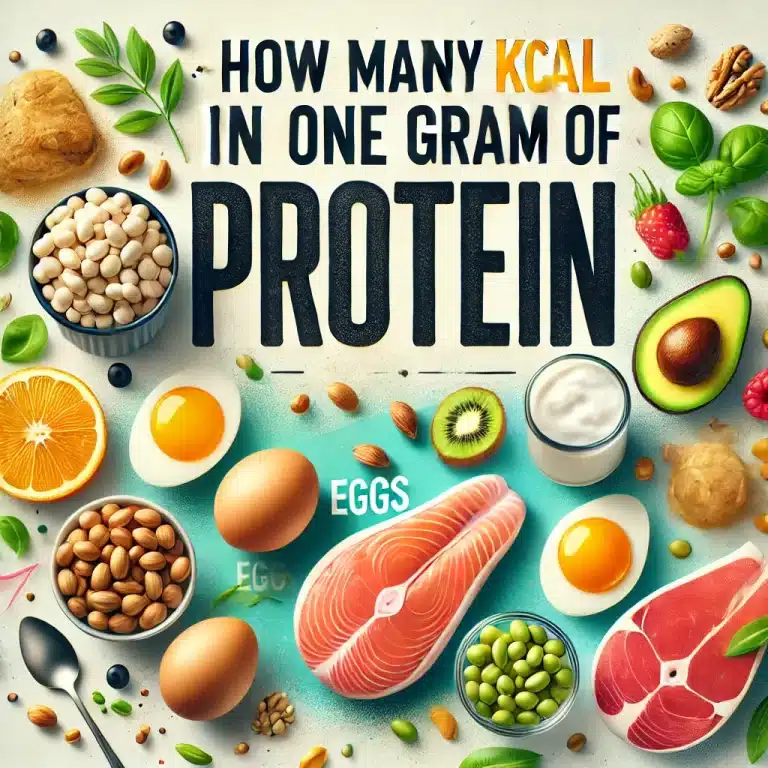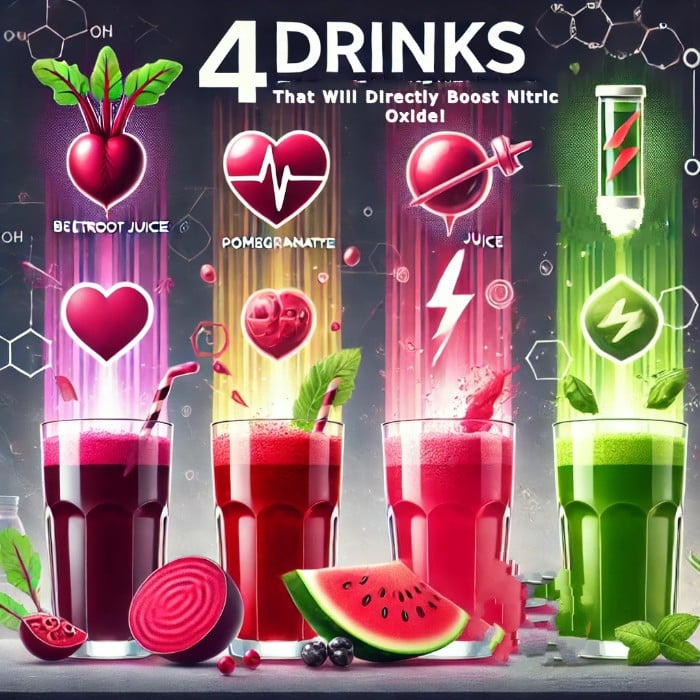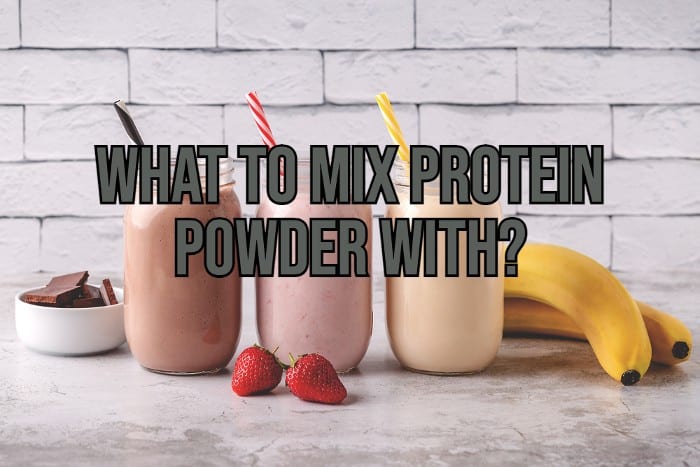Does Lemon Juice Break A Fast? (Lemon Water)
No matter whether you’re trying to lose weight, get in shape, improve your health, or simply feel a little better in your skin, there are multiple benefits of fasting. Because of this, however, people also have questions, such as ‘Does lemon juice break a fast?’ Well, that’s what we’re going to be looking at shortly.
Fasting, if done correctly, offers those who participate in it a wide range of advantages, yet there are certain things to be aware of before you choose to take part. If done incorrectly, not only will you fail to achieve your goals, but more importantly, you could potentially put your health at risk.
Fasting is not about starving yourself, but rather, about limiting the amount of calories that you consume during a specific period. While you aren’t necessarily permitted to eat during certain times of the day when fasting, you must ensure that you are drinking water and staying hydrated.
While drinking water is all well and good, after a while it does get a little too repetitive, which is why people look for ways of making their water more exciting, such as combining it with lemon.
What Is Fasting?
The term ‘fasting’ is as broad as it is long. There are a variety of different ways of fasting, with each one offering its own set of rules and unique benefits and drawbacks. Put very simply however, fasting is a process whereby you abstain from eating during a set period, or you eat very little and restrict your calories to as low as 500 per day, depending on which fasting protocol you happen to be following.
People may fast for a wide range of different reasons. Some people will fast for weight loss, some will fast for religious reasons, some will fast for health purposes, and some even fast due to core beliefs and ethical reasons, I.E hunger strike. There are many different types of fasting (which we’ll look at in more detail shortly) but the basic idea is that you go without food, or you consume very little food, for a set duration of time.
Because you are getting no energy, or very little energy from food, however, hydration during a fast is more important than ever. When you fast, you need to ensure that you’re consuming enough water, replacing lost electrolytes, and keeping electrolyte levels topped up.
If you don’t, you run the risk of all kinds of different ailments and health issues.
Can You Only Drink Water During A Fast?
When you fast, keeping your fluid levels topped up is essential when it comes to your health and well-being. People always assume that water during a fast is the only liquid you can consume, but that isn’t always the case. Some people will consume lemon juice when fasting!
When you fast, you can consume other liquids such as black tea, bulletproof coffee, plain green tea, or black coffee. You can only consume these in their natural forms, however, I.E without milk, sugar, cream, or any similar ingredients. Other people who prefer a cold drink, though, may find themselves turning to lemon juice instead, but is this beneficial for their bodies, and their fast, or will this be doing more harm than good?
Does Lemon Juice Break A Fast?
When you wake up in the morning you need to replenish fluids you lost during the night. You also need to replenish fluids and electrolytes lost during that epic morning pee, which always seems to last forever. Most people in the morning will turn to beverages such as black tea and coffee, but the caffeine in these drinks can cause more harm than good. Caffeine may perk you up and leave you feeling more energized and alert, but it is still a diuretic.
A diuretic causes your body to excrete more fluids than you consume, so even though you mix the tea or coffee with water, once the caffeine has done its thing, your kidneys will filter out more water than you consumed, so you run the risk of dehydration.
This leaves water as the obvious choice for hydration, and while water is indeed great for hydrating the body and keeping your electrolyte levels topped up, it is lacking in certain vitamins and antioxidants such as vitamin C, and it can taste a little boring after a while too. One of the best ways of making your water more enjoyable, and also bumping up its nutritional value even further, is with the help of citrus fruits, such as lemon. But, does lemon juice break a fast?
Generally speaking, the answer to that question is no, but there are a few exceptions.
If you were to simply drink a glass of water in the morning with a few slices of lemon in there, along with a touch of lemon juice, this would be incredibly low in calories and would be virtually sugar-free. This means that one or two glasses of lemon juice in the morning will NOT break your fast. If however, you were to drink heaps of lemon juice, with countless lemons in there, along with their juices, this will bump up the calorie content and the sugar content.
This could be a problem. Anytime you increase your calorie consumption significantly while fasting, you run the risk of breaking your fast.
There have even been instances whereby people in a state of ketosis have remained in ketosis, despite drinking an herbal tea with added squeezed lemon and sweetened with honey. The fact that they remained in ketosis showed that they had not consumed a large enough amount of carbohydrates (sugars) from the honey and fruit, to knock them out of ketosis.
This is a great indicator that their bodies remained in a fast state.
There have, however, been a few exceptions. For example, people who have been trying to fast have been unable to tolerate the sharp and sour taste of the lemons and have therefore sweetened their water with honey, or even with sugar.
Those who like it sweet have added too much, and this has harmed their bodies from a fasting standpoint.
So the answer is no!
As long as you go easy on the lemons and don’t add extra fruit, honey, sugar, or other ingredients containing calories, you shouldn’t knock your body out of a fasted state and you shouldn’t suffer the adverse effects of consuming too many calories.
Benefits Of Fasting
Before we look at why adding extra fresh lemon to your water is so beneficial, we’re first going to look at some of the main benefits of fasting.
May Fight Inflammation
One of the main potential health benefits associated with fasting that we’re going to be looking at today is the fact that it may fight inflammation. Inflammation is a perfectly normal process in the body that is triggered as a response to various stimuli that the body is subjected to.
High levels of inflammation, however, can lead to chronic inflammation that can lead to a wide range of health issues and ailments.
Chronic inflammation can be a precursor for cardiovascular disease, strokes, heart attacks, hypertension, and much more. Even the less serious health issues such as migraines, joint pain, muscular aches, and headaches can be pretty nasty and can leave you feeling awful.
One of the main reported health benefits of fasting, however, is the fact that fasting may help to reduce and even prevent inflammation. Studies have found that fasting can help to reduce the levels of C-reactive protein in the body, which is a marker for inflammation.
Can Promote Weight Loss
Without a doubt, one of the most common reasons why people choose to follow a diet plan that promotes fasting is to lose weight.
There is a lot of science behind fasting, and how it affects your body internally can influence how much fat you burn, how much you store, and how fast your metabolism runs. With that said, however, weight loss boils down to calories in versus calories out. At the end of the day, fasting is a dietary protocol that restricts the amount of calories you consume in a day.
If you consume fewer calories than your body needs for maintenance, to make up for this deficit your body will tap into your body fat reserves, which means that you’ll lose weight. Not only does fasting allow you to create a sustainable calorie deficit, but it also helps to speed up your metabolism so you feel better, have more energy, and burn more calories, even in a rested state.
Fasting May Boost Natural Growth Hormone Production
Over the years we’ve seen a sharp increase in the amount of bodybuilders and strength athletes following a fasting diet plan in some form or another. To some, this may sound counterintuitive as bodybuilders and strength athletes need calories for energy, and protein to build muscle.
The main reason for this shift in their nutrition, however, is the fact that fasting has been found to naturally increase the amount of growth hormone (GH) in the body.
There have been studies carried out over the years that have found that fasting could increase the amount of growth hormone, or Human Growth Hormone (HGH) by as much as five times in males. HGH promotes muscle growth and repair, increases strength, boosts recovery, strengthens your tendons, can regulate your hormones, stabilizes blood sugar levels, and a whole lot more.
You Can Have Your Cake And Eat It Too
People hear the word ‘fasting’ and automatically think the worst. They assume that fasting means that they must starve themselves until they waste away. This is not the case, though. It’s the exact opposite. One of the most popular forms of fasting is what is known as the 16:8 diet. This means that for 16 hours per day you fast, and for an 8-hour window you can eat whatever you like, within reason.
If for example, you have an average-sized dinner and you feel like a small slice of cake for dessert afterward, you can enjoy a dessert and still be in a calorie deficit for the rest of the day. As long as you are sensible with your calories and you don’t binge eat or stuff your face just for the sake of it, you can easily remain in a calorie deficit for the day, and lose weight at the end of the week.
May Promote Cognitive Function
Another of the main reported health benefits of fasting is the fact that it could help to promote cognitive health and function. Research carried out on mice found that fasting could help to enhance brain structure and boost brain cell production and regeneration.
This in turn means that it could help to improve short-term memory and enhance cognitive health in general. More exciting still, however, is the fact that fasting has shown great promise when it comes to the prevention of Alzheimer’s Disease, Parkinson’s Disease, and other degenerative brain diseases and ailments that may affect people later on in life.
Why Drink Lemon Juice With Water?
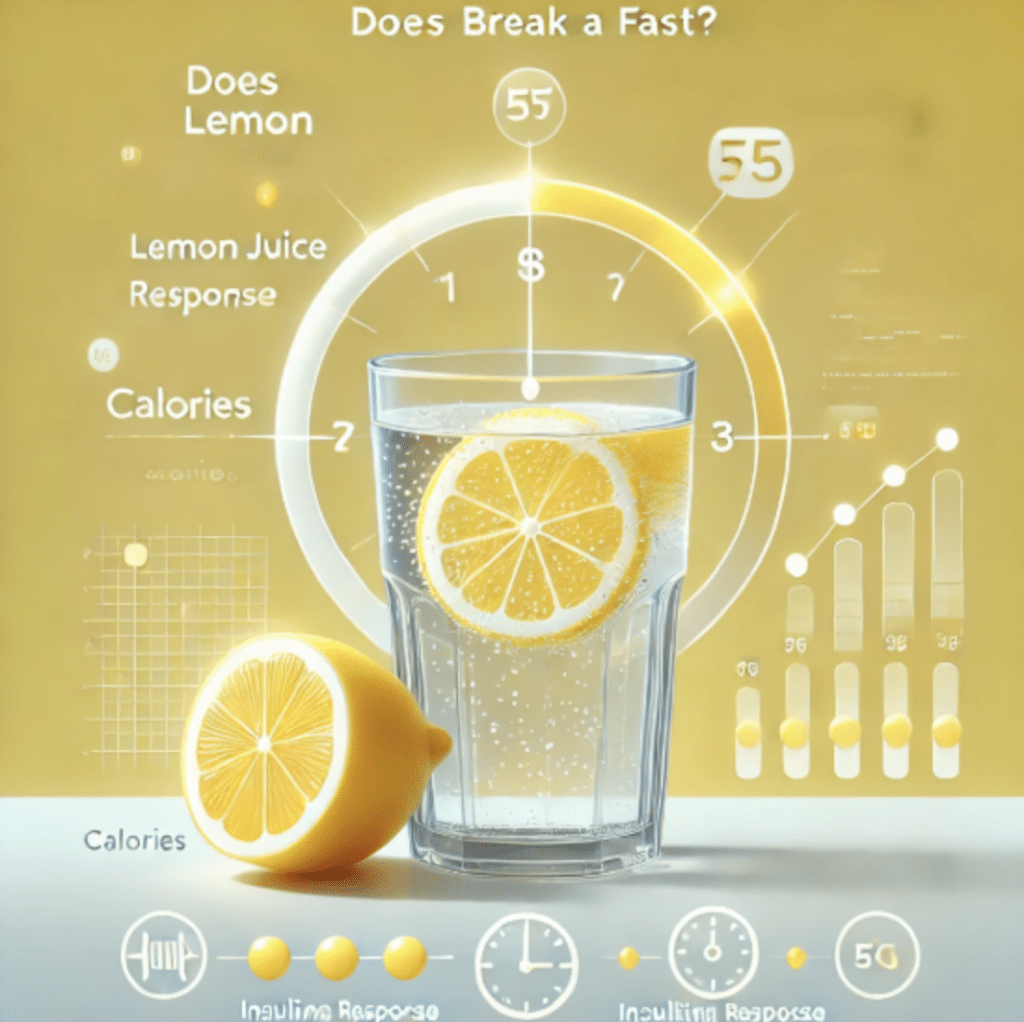
Okay, so we’ve looked at what the main health benefits of fasting are, but what we haven’t yet looked at is why lemon juice during a fast is so beneficial.
Here are several reported health benefits of drinking lemon juice and what it is that makes it so beneficial.
Rich In Vitamin C
As great as mineral water is to drink, one of the main downsides is the fact that it is lacking in vitamins. The body needs vitamins for it to function correctly, particularly vitamin C.
Vitamin C functions as an antioxidant that boosts the immune system, fights inflammation, and helps to destroy free radicals in the body that can damage the cells and lead to all manner of health issues, including cancer.
Lemons are a citrus fruit, and like all other citrus fruits, they are loaded full of vitamin C. A lack of vitamin C can lead to a weakened immune system, it can leave you with unhealthy skin, hair, and nails, and it can leave you feeling tired and lethargic.
By combining fresh slices of lemon with your mineral water, however, you can increase your vitamin C intake without taking in any noticeable calories.
May Help Digestion
One of the main side effects that people report when it comes to fasting, is digestive issues when they eat. People who fast often experience indigestion, heartburn, diarrhea, or constipation after they eventually eat a meal. Lemon juice has been shown as a potential digestive aid, as the polyphenols in the fruit help to prevent age-related changes in the gut while promoting a healthy balance of good gut bacteria.
Tastes Great
Perhaps the simplest and most effective benefit of drinking lemon juice, however, is the fact that it tastes great.
Lemon juice tastes of, well, lemon. It’s zingy, it’s citrusy, it’s refreshing, it’s slightly sweet, and it is a great alternative for days when you just can’t face the thought of drinking yet another glass of plain and boring water.
May Help To Protect Against Kidney Stones
Finally, another reason why people often choose to drink lemon juice is because it may help to prevent kidney stones. Lemons contain citric acid, which has been found to prevent the build-up of calcium oxalate in the body, which causes kidney stones. If you’ve ever experienced kidney stones, you’ll know how painful they can be. If not, think yourself lucky as they are very painful indeed.
Final Thoughts
Okay, so, does lemon juice break a fast? No!
Lemon juice with water in the morning is easy to drink, it’s refreshing, it tastes great, and it provides plenty of health benefits in the process. Not only that, but as long as you don’t add extra calories to it, it will be virtually sugar-free and calorie-free, and will not do your fast any harm at all.
